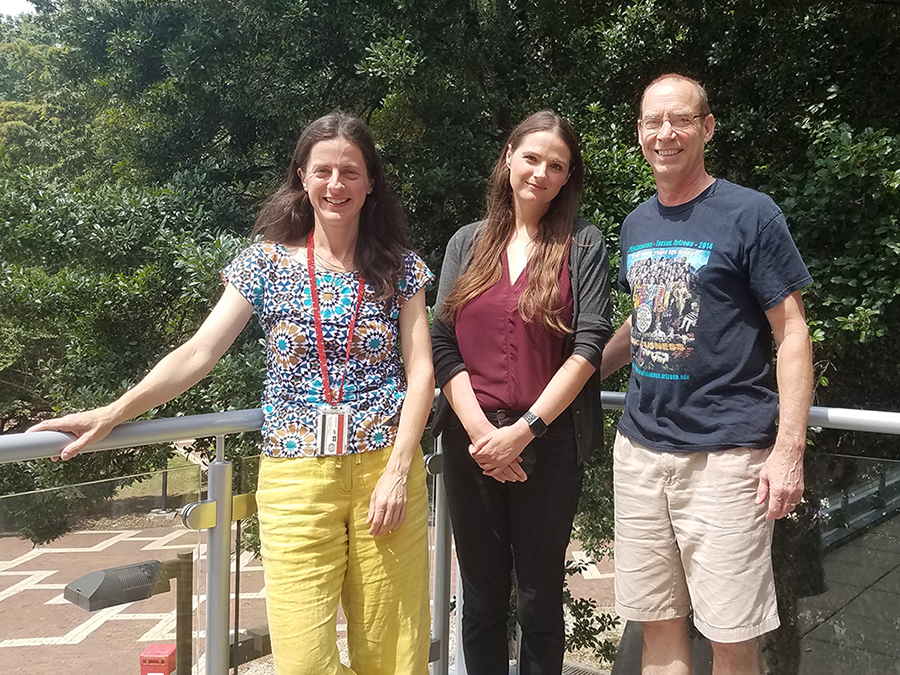
From left to right: Gwyneth Thayer of NCSU libraries; Rachel Robison-Greene; and former CAF board member and professor of philosophy at NCSU Gary Comstock.
In 2019, the first annual Tom Regan Visiting Research Fellowship was awarded to Rachel Robison-Greene, a Post-Doctoral Fellow at Utah State University researching the in vitro meat revolution. The fellowship was established through the generosity of the Culture & Animals Foundation in memory of Tom Regan to promote scholarly research in animal rights. The fellowship supports the use of the Special Collection Research Center’s Animal Rights Archive—the largest scholarly archive of animal rights collections in the country. The fellowship provides a $4,000 stipend for research completed in residence at the SCRC.
Rachel Robison-Greene received her Ph.D. in Philosophy from the University of Massachusetts, Amherst in 2018. Her dissertation was an exploration of the role of reflective endorsement in understanding the self and in judgments about what ought to be done. She is a regular columnist for the ethics periodical The Prindle Post, where she writes primarily about animal ethics, environmental ethics, and the ethical dilemmas we face as a result of emerging technologies. She is currently working on a book titled Under A Suitable Medium: Critically Analyzing the In Vitro Meat Revolution. She is the co-host of the popular culture and philosophy podcast, I Think, Therefore I Fan. Robison-Greene sits on the Executive Board for the Association for Practical and Professional Ethics, and is the Secretary of the Board of the Culture & Animals Foundation.
Robison-Greene described her research project as follows:
In Under A Suitable Medium: Critically Analyzing the In Vitro Meat Revolution, I consider the philosophical dimensions, and in particular, the moral dimensions of cultured meat. In the early chapters of the book, I explicate the lessons to be learned from both rights-based and utilitarian approaches to the treatment of animals, and I apply those lessons to the issue of in vitro meat. I consider the moral scope of this form of meat production—we could use this technology to produce meat of any type without harming the creatures involved. The possibilities raised by this technology allow us to see more clearly, using a wide range of test cases, what, if anything, is wrong with the consumption of flesh from various origins. I will consider whether there are morally relevant distinctions to be made. I raise the question of whether providing new market alternatives is the best way to bring about moral change and suggest some answers. Ultimately, I argue that the notion of “edibility” has a moral component and that changes in the way that food is produced call for a dramatic revision of how we understand the notion of “edibility.” I was very excited to see the announcement for the Tom Regan Visiting Research Fellowship. I have long been strongly influenced by the work of Regan. I’ve taught his work every semester in my ethics classes over the past eight years. His work has been very important to my research as well. I [am] delighted to have the opportunity to immerse myself further in Regan’s work, and to have access to the Animal Rights Archive.
Rachel said:
I was very excited to see the announcement for the Tom Regan Visiting Research Fellowship. I have long been strongly influenced by the work of Regan. I’ve taught his work every semester in my ethics classes over the past eight years. His work has been very important to my research as well. I [am] delighted to have the opportunity to immerse myself further in Regan’s work, and to have access to the Animal Rights Archive.
Rachel wrote that, subsequent to completing the fellowship, she now understood Regan’s “contributions to philosophy and to the animal rights movement in a way I could never previously have anticipated.” She appreciated his honesty and transparency in putting together the collection, including correspondence, acceptance letters, rejection letters, referee notes, and more. Rachel further commented about how inspired she was to see all the drafts and edits Tom went through in his work. She noted the ways in which he dealt with challenges he encountered with honesty and integrity. She writes, “He also included his teaching materials and I was very impressed with the attention to detail they demonstrated. It was very clear that teaching was, to him, about creating good citizens who understood that philosophical questions about equality and value are not merely entertaining abstractions suitable only for armchair reflections. I couldn’t agree more.”
Rachel’s work was published in her book Edibility and In Vitro Meat: Ethical Considerations (Rowman & Littlefield, 2022). She had previously read most of Tom’s books but benefited from reading his papers, as well as drafts of papers and speeches. She was able to get “a much better understanding of what the Rights View might have to say about these new questions.” She continues: “The collection at large gave me a real sense of the scope of literature on animal rights and animal welfare across space and time. Some of my favorite experiences were looking through Victorian literature on slaughterhouses and vivisection. I appreciated the enduring and compelling arguments for animal protections. I also marveled at the magnitude of the challenges animal activists have always faced and continue to face. It was a joy to get to know CAF. The organization was clearly very important to Tom. In my final days in the collection, I looked through the boxes that told the CAF story and was very impressed with all of the people doing such valuable work.”
She also wrote piece for an ethics periodical about part of the collection called “How Long Must We Wait?”: Lessons from the History of the Animal Welfare Movement, which can be read here.
The Winter 2019–2020 issue of FOCUS, a magazine from NC State profiled Rachel. You can read the article here.

